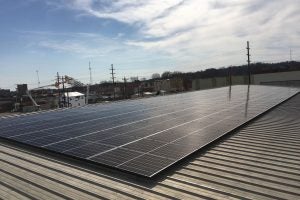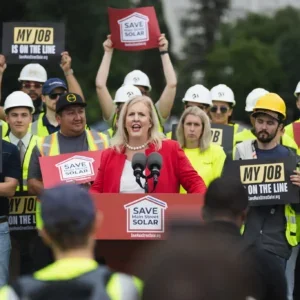March was a dramatic month for solar in the Commonwealth, with the Kentucky House & Senate pushing through a bill to fundamentally change how Kentuckians are compensated for the solar power that they make on their roof. We’ve been getting lots of questions from folks about what this means for all the homeowners, business owners, and community organizations that we’re helping to go solar. So today we’re going to explain what the bill does, and doesn’t do.
SB 100 (An Act relating to net metering) was signed into law by Governor Bevin this week. Previously, Kentuckians who went solar tapped into the state’s net metering laws–the rules that require utilities to provide credits on your monthly bill when your panels produce more than you use. Currently, net metering provides credits valued the same as what you pay the utility. It’s a fair trade. 1 kWh of solar now means you can draw another kWh of power back at night or on a rainy day.
But with this bill, the state public service commission will go back to the drawing board and analyze the value of solar energy to the power grid–how much energy didn’t have to be bought, the maintenance avoided, the avoided loss of power as it was traveling over transmission lines–those sorts of things. While we don’t know what that rate will be exactly, we do know that solar is incredibly valuable. After all, the price of power is highest on hot afternoons when everyone has the AC cranked (funny enough, that’s when solar panels are working hard). And solar power is produced right where it’s used–in the house or office. Once SB 100 goes into effect, solar doesn’t go away, it just means that things get a bit more complicated (fortunately, we’re here to translate when it does).
BUT–SB 100 does not take effect until January 1st, 2020. And according to the law itself, everyone who has a system installed and connected to the power grid before the public service commission creates new rules is grandfathered into the existing net metering rules for 25 years. That’s 25 years of knowing that you’re getting credits for your solar energy at the retail price of electricity (which will likely keep going up, increasing the value of your credits year after year). After 2019, the federal solar tax credit starts declining from its current 30%.
So for any Kentuckian who has ever been thinking of solar, in spite of the legislation, 2019 is an incredible time to go solar. It’s a year to lock in your net metering program for 25 years, while getting the tax credit at the highest it will be. Couple that with Solar Holler’s no upfront cost financing programs, and you can be sure that you’ll be protecting yourself from future rate hikes, while investing in your own system.





